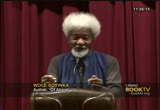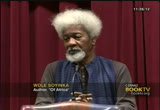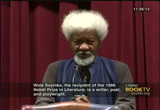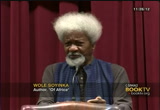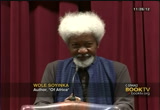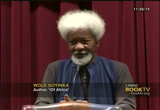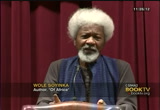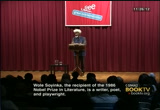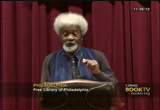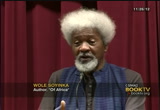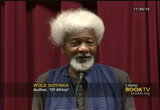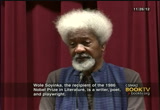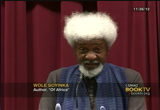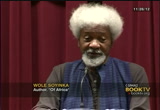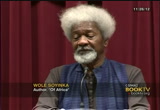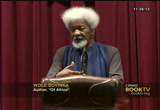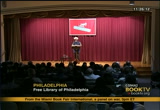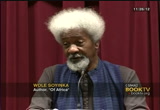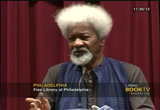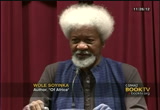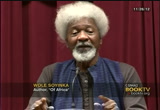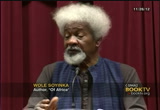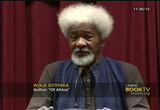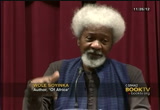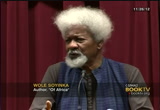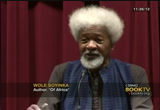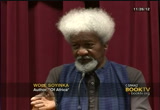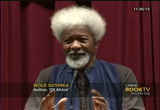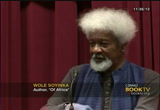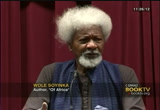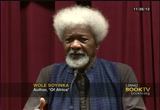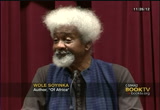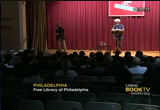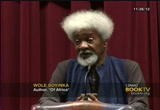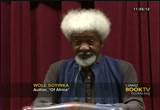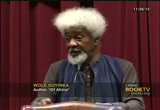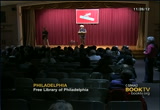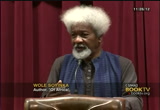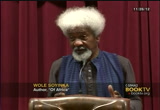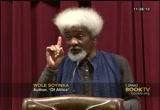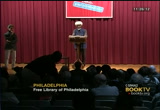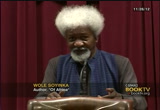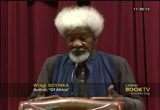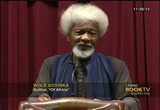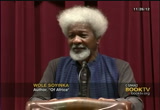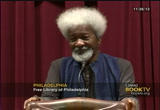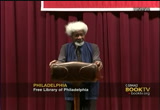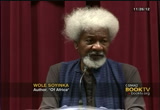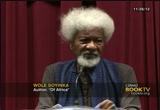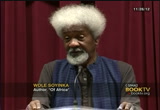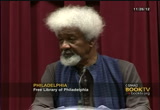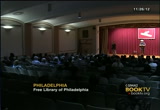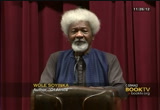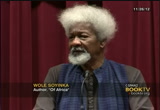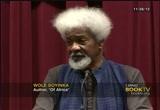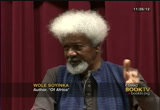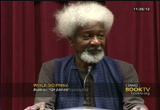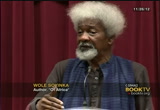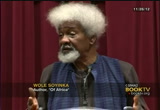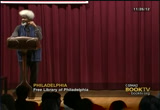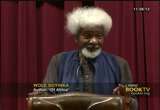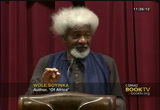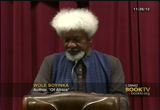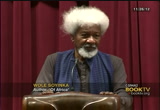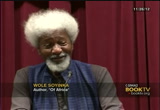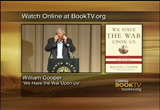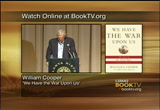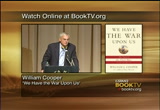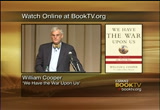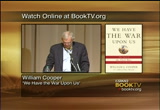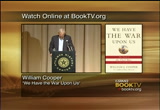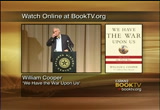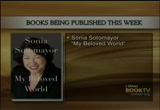tv Book TV CSPAN January 12, 2013 2:30pm-3:45pm EST
2:30 pm
thank you so much. >> thank you. >> up next, nigeria nobel prize winning author talks about the history of africa and the challenges facing the continent today. this is about an hour and 10 minutes. [applause] >> thank you very much, thank you. thank you and good evening. i hope that you were not expecting a formal lecture. i was told this was to be a conversation, but a few minutes ago i half understood that some people were expecting a formal lecture. it doesn't matter. we'll have a conversation. [laughter] i thought, well, let me make remarks about the book, and begin by asking the question which i pose myself why this
2:31 pm
book of africa, huh did it come about? i was, you know, just why did i write the book? no, because i didn't really write it. i was just putting down a continuing conversation, a continuing discourse in which i've been engaged, i think, most of my life, but if you want examples, if you want some immediate instances of the kind of encounters that led inevitably to putting down notes on the subject matter of the book which, you know, tries to cover quite a bit of range, let's just take the religious side. in the green room just there now, i saw on the wall a poster. title, just announcing, i think,
2:32 pm
a lecture, and the title is "the greatest shoe op earth. -- "the greatest shoe on earth," and also author of "the god illusion." now, sort of strange to think that in certain parts of the world today daring to put up such a poster, much less admitting to being the author of "the god illusion," you could be stoned to death or put to death any other way for blasphemy. second incident today, i was speaking to a young lady, and she was telling me about her experience. she obviously read the book, and she was also lamenting the prejudice, extremist very
2:33 pm
intolerant taking place in various sectors of the world, and used an interesting expression. she said, i grew up in an environment that was christian in which people followed their christian religion, others followed their muslim religion, and others their african superstitions. for me, this went to the heart of why the book was inevitable, or why, for me, i was engaged this this discourse all my life. it's very strange. i found it very interesting today, close to 80, i should actually exist in an environment in which for admitting what i believe or for believing what i do not believe to be considered of what i call terminal censorship. now, go back to the history, and
2:34 pm
i don't mean just me personally. i'm talking about the society in which i live, in which i was raised, the history of my people as i now write in the book, when the european explorers, of course, always quickly followed by religious storm troopers, the missionaries came to africa on the mission of conversion, they had a very serious problem, and that was they could not find satan. they couldn't find the denver. now, if you want to convert people, you have to persuade them that they -- that their soul is in dire danger, that they are headed for the ultimate bonfire on the other side of existence. from that, you need to label them followers of the devil, satan. they look for the devil, and
2:35 pm
looked among the deities, and complex religion, very elaborate, well structured, and they looked among the deities, and they found issue. now, whose issue? i refer to this as the imminent imminent -- an issue to teach humanity that there's always more than one side to any issue, more than one face to any appearance, the best plans advice of men is an embodiment
2:36 pm
of the lesson embedded in such things. talking about the folly or being dogmatic about any issue, tends to do it in a rather painful way. you know, like ad good teacher armed with a cane, looking at both sides of the question, and his places are the cross roads which, of course, the place where human beings get confused. which road do you take in a cross roads? issues so mischievous, he's not allowed in the house. his place is always on the doorstep because issue in the house is just too temptmental, and before you do anything, before you worship even any of the deities, you make sure you
2:37 pm
set aside a morsel, a messager of the deities, deliver the message straight, but deliver it in a way without lying that makes you misinterpret the message, but that's because he has not listened to you in part. when the missionaries gaves look among the other deities, the god of lightning, god. rivers, god of purity, god of war, god of the moist elements, ect., ect., that's the uncertain. this mischievous person upset the plants, that's the devil so issue became for christians, the devil, satan, and even in the interpretation, translation of the bible, each time fear of the devil set in, it is issue, but issues anything but evil. that is the truth. on the contrary, you will find a
2:38 pm
cymbal of issue in the definition bowl because they help interpret this and defie the scriptures with wisdom, even from ecology, all the wisdom of the bound up verses, and the -- whose verses the definer recites, a devine source of human beings. it's anything but the devil, but today is very painful to find one's own countrymen and women referring to issue as the devil. by contrast, look at what happened to issue when he moved with the sleeves to latin america. having arrived with the issue,
2:39 pm
feared by the christian missionaries, the slaves adopted this as their patron deity. just to scare the christians who wanted them to convert. it became the cymbal of resistance in latin america and in the americas. in fact, it went beyond that. in certain parts of brazil, for instance, that part of brazil has been elevated to the supreme deity simply because that was a cymbal that was there, protagonist for freedom. you find the transposition of deity across the atlantic, how not minor, but junior deity became not only the symbol of resist tense, but the supreme deity in certain parts of brazil for instance. on the con tear --
2:40 pm
on trair if -- on the contrary, if you go to a shrine, the hierarchy is plane, but in certain other parts, the issue became the supreme deity. now, consider today, the history of missionaries in africa, in the world especially, and this goes back a couple centuries. imagine that today, to be a follower of the religion is virtually to earn the death sentence in certain parts of nigeria. christians also earn the death sentence in certain parts of nigeria, and some of the christians respond in kind and set upon colleagues, usually enterprise, but the level of
2:41 pm
intolerance based on ignorance has reached such a pitch that you open the papers any time today in nigeria, you find that the church has been burned down, worshipers machine gunned, a mosque burned down, worshipers bombed out of existence because, you see, even within the religion, there are different grades of purity. one side considers the other side not sufficiently peer, and, therefore, deserving of what i call terminal censorship. the niger institution, however, is more complicated as it is, in fact, in other societies. there's never one single issue that leads to total discapitallization of society. yes, to --
2:42 pm
politics into it. these are parts of the growth, the widening of the area of fanaticism. when the politicians want power, they have no scruples whatever. they can utilize, and they do utilize any differences whether ethnic or religious. right now, the going principle of the faction is religion. we're on very strange political system moving on now to northern nigeria which you must have heard quite a lot. meaning of which is the book is -- [inaudible] if you're in the library here, i'm afraid you deserve terminal sensorship, all of you.
2:43 pm
[laughter] schooling, anything at all to do with anything outside the koran it is very easy to mobilize the -- the youth, who sit at the feet in the madrassas, a school, and who believes life begins and ends on the instructions of the mula, the cleric in charge. the politics became complicated because of what the british did. they were not just satisfied of grading the sanction among the believers. that was not enough. there had to be division in the country. when the british left, before they left, they created
2:44 pm
surrogates, and, actually, the appointed surrogates closest to their own pliable or at least already practicing a kind of structure, feudalism which is close to what the british of its practices at the time until late into the 20th century, and so they not only falsified the elections that followed, that proceeded independence. they falsified even the senseless. now, this was in custody, if you check the notes of the so-called home office which is where the colonies of the british are administered, they look for the book of harold smith, a civil servant in nigeria at the time. he got into trouble because he did not want to carry out
2:45 pm
orders. he was ordered to participate in the falsification of sensors, but falsification of the first elections. in short, the bar was handed over to what they considered the backward north, the feudal north. very suspect because they were radicalized by western ideas, british uncomfortable with that so they left power in the hands of the north. that political dishonesty led to a long story, cutting it short, but led eventually to the very first military cue in nigeria which was staged by -- led by certain southerners from the eastern part. there was a reprisal, and then a
2:46 pm
series of massacres, civilian massacres which led eventually to the secession of the eastern part because they were the largest victims, singled out for having initiated the first clue, and for being guilty of killing some of the northern leaders, but there's no disputing that fact. power was restored eventually through the counter coo to the north. we suffered in nigeria, i don't know how many decades of military rule, eventually, up to the last dictator, very kindly took leave over us in nigeria and went to higher realm as we see in nigeria to the service of god and trout -- throughout the world. the next president in nigeria was a former military man also who had been president, who happens to be from the south.
2:47 pm
now, remember when the british left, they left power in the hands of the north. for eight years up to the military left power, however, power was in the hands of the southerner. the ruling parties, however, inserted a principle which was just the same as the british left behind, power to remain in the north, the expression at the time was that power was just lent to the south for a few years. it must revert to the north and continue the tradition that the british had set. this is not palatable, and unfortunately, the president of the nation who took over after the other left was a very sick man, and it went on for ages, not going to bore you with that, but for about six months, nigeria didn't know whether they were ruled by a growth or by a
2:48 pm
living being. it was really interesting drama that went around went on around the presidential office. eventually, he succumbed to nature, and the presidency fell after the constitution on his vice president. who was southern. well, the tradition must be upheld, and within the ruling party, they had already inserted that clause that power would rotate between the south and the north. now, here was a southerner in power after lots of turbulent shy nangans going on, just called acting president, be called deputy president, anything but following the constitution because they wanted power for a being in the north.
2:49 pm
eventually, he took over as president, and then he went on in his own right now to contest election. you know the power of incumbency. i know what elections are like in that part of the world. it was a fore gone conclusion he became president. power was slipping away further and further from the north. when i speak of the north, by the way, i want to be very careful here and emphasize i'm never talking about the entire north, but i'm talking specifically of a hard core north, to whom the very concept of democracy in the fullest sense is complete -- routeless who ma nip lace, serve themselves into the -- i want to ensure that in the hands of the most corrupt among the north so
2:50 pm
i don't use expressions like the northings but confronted by a very determined mafia, northern mafia who has remain with them. this, his name is, by the way, the president of nigh nigeria ws sworn into power sitting there for four years, and rumblings began he was going to go for a second term. now, this hard core looked at what is happening and decided that it was time to ensure that there was no repeat of the last mistake. that is when they inserted the religious cycle and said to those thinking they are in had
2:51 pm
danger. they want to take over power and stay there forever. they sent them off for training to somalia, so somalia to later on some of them even into afghanistan. all these facts have been coming in. i'm not just making them up, until eventually the religious movement in nigeria, northern nigh year ya, became ally to al-qaeda. this now is an admission which the government is reluctant because it reflects the actuality. there you have the volatile cocktail of politics and religion because the weapon, the motivation of the foot soldiers is to create an islamic state in nigeria. it's not something anybody dreams of. there's videos, you know, the
2:52 pm
usual video, you know, crossing each other, you know, ends on, yes, we want an islamic state. in fact, one of the leaders went so far when the government was in -- political leaders proposing amnesty, and, no, no, we're not going to talk to the president, he's a christian. until he converts, then we're willing to sit down and negotiate with him. every time, oh, please come, talk to us, we will listen now. we don't know what you want. i said, don't be stupid. you said it so often. you know very well what the motivation is. that is the reason for the devastation of the north today. a country in which utter years, years of independence, certain sections of the country,
2:53 pm
disposable material. very interesting thing happened, in violent political movements, some of these were sent out for training came back holier than their masters. they came fully indoctrinated and they said wait a minute, look at them in their mansions, their suvs, some own private jets. this is the not the kind of muslim we were taught. enemies of islam, and so they become complicated by the fact that their mentors became some of the front line victims, but primarily, the structures, schools, institutions, libraries, if you like, the
2:54 pm
media, and that includes even means of technological means of communication. mosques being blown up. i think they stopped eventually when they realize they couldn't communicate with their mobiles over the next thing, but taken down half a dozen or so before i think somebody among them said, listen, how are you going to communicate, and so that particular thing stopped, but the killings continue. the churches, the mosques, because some of them are considered infidels, belong on the wrong side of things, and so all of this began to bring to a boil the whole essence of religion, what role does it play, and in any case, why are some religions considered more violent than others? is it ignorance of the other religions which we know exists
2:55 pm
and are not merely among outsiders. there are others, for instance, that happened once, i collect things like carvings and so on, but one man, has the biggest and most varied collection you can imagine in your life, and a worker came to his house one day, an electrician and said, okay, the problem is upstairs. went upstairs. this is in the heart of it, and they went upstairs, and few seconds later, this man came down screaming. in the name of jesus, oh, the blood of jesus, this shall triumph. everybody is looking, what's is the problem? he got there and encountered carvings of the various deities. work of arts there, but because
2:56 pm
they were not by picasso or, you know, so they were works of the devil. this is nigeria. it's encounters both on the comic level, the absurd level, and on the tragic level which really is where we are today in a situation where these holy warriors, good institutions, and this is one incident. went to the school the institution, had a list, taken the trouble to penetrate and take the list, and they called out students one by one and shot them, 46, shot them, knifed them. i try as hard as i can to be as even handed as possible in the book, but these are issues which agitate one rightly, i think.
2:57 pm
i say i try to be as balanced as possible. i claim that because i have a feeling that if the book, if the process, because a book sometimes begins, even the printing process to some of you know, lie briar, can begin, can take two years to come out. the book had come out, and certain incidence had happened, specifically one incident had taken place, which, for me, was one too many. i would have ratherred left if they permitted me another paragraph, and then i wouldn't have been so nice. the situation where certain religions want to privilege themselves even to the extent of assuming the power of life and death over our own believers,
2:58 pm
many did, when they sentenced a killing for our own, and that's one of the most unacceptable events in the history of literature in our contemporary society. one believes that happened in the last century, and it's that spirit of arrogant intolerance which is contributed to my need to write because it goes beyond religion and enters politics, enters principles of j's and who executes justice, who pronounces justice, and for what, in what cause. i participated just around in a conversation as soon as possible. i contributed to a conference recently in the united nations in new york. it was one of these peace conferences, dialogue of cultures, dialogue of religions, so on and so forth shortly after
2:59 pm
the film was made by some boarish film in the united states, and this, of course, again, yet again led to killings all over the world, everybody batoning down the hatches, and the question i ask myself, and, again, the sort of question i ask what contributed to the books, why is it that any one religion considers that it is so -- it cannot be commented on either through film or theater or through song, what's any theme, any prohibition is in the public domain, it is subject to public commentary, and for any religion to claim this, it's a con tin ration of the same that denigrated other religions in
3:04 pm
private conduct, then it is no business of government. and it is ridiculous that the government should have this. my hand touching yours, it's no different in somalia. a man shook hands with a woman. and there is absolutely no difference between the two. what is particularly absurd is the hypocrisy. we had a case not so long ago of a senator who imported from
3:05 pm
3:06 pm
they shouldn't do, they wouldn't do. and i cannot nearly understand that. this girl was picked up and i can't understand the laws of the countries. the important things that people suggest. it's like they don't have moral authority to propagate and edit like this. >> another question about this. >> thank you. i believe that we can say that it is a great focus. most countries are original and compare religious development right now.
3:07 pm
and i turn to christianity, also islam, if you look at this in this condition, they seem to be more proper and developed and i just would like to know your comment about it. >> thank you. >> [inaudible] i believe that religion can be problematic as an issue. but fortunately religions are tied to cultures. they are culturally tied to the roots. especially when you are culturally rooted, you become
3:08 pm
creative. the japanese have their religion and you can see how advanced they are in the sciences. the chinese can be religious as well. and they became determined capitalists. and basically they are rooted in this. and i agree with you, absolutely. one thing i forgot to mention was christianity and the americas and what they did was say that we will not follow the old religions.
3:09 pm
3:10 pm
it had to do with christianity and there were a lot of deities and they worshiped with the same liturgy. so religion itself like culture, it is not always respected. >> now we will go to the gentleman back there. >> hello. as a second-generation consumer of the culture, i find myself representing this. >> yes, i am a consumer of yoga culture. since we have been children we have consumed it as a fiction and yet you made a statement
3:11 pm
that as long as we continue to fictionalize this, we are doomed to repeat this thing that perpetuates the same problems. can you comment a little bit on how we, as a young generation, can reconnect to the essence of our culture? that we can carry on and have regained something we have lost. >> the question is what would you say is your religion today. you are talking about a second-generation. and those who are exiled. well, the question you must ask yourself is to what religion do you feel attached?
3:12 pm
if you feel that you are a christian, then feel to stay that way. if you feel muslim, then stay that way. i know of a number of people from the caribbean and the americas who have made pilgrimages home to find out what is the sense of neutrality. whether we are religious or not, all of us are spiritual beings to some degree. many people get the restructuring of the spiritual feeling. all religions are equal.
3:13 pm
we have shrines of creativity and music and it can make a fascinating reading. including the arguments that go into this. from that point of view, i don't think it's fair to compare and follow your but were other religions because you come from africa. but i think you would be losing something if you did not make a comparative attitude. >> any other questions?
3:14 pm
>> could you talk more about where the name came from? >> yes. one of the things we are very good at his names. we have the most exciting and fascinating array of names. and if the guns from the traditional languages. when you see names like this, good luck, god's will, blessings, there is one name that i refuse to call them and his name is sweetheart. [laughter] i don't know you, you're not my sweetheart.
3:15 pm
so many of these names are literal translations and so some ask about what they want to say. and the name was called good luck and heaven knows what happened. but i think that this is an image. >> okay. the gentleman off to our left has a question. >> okay, i wrote a book many years ago about the open sore on
3:16 pm
the continent. speaking specifically about the execution of [inaudible name] and it is a kind of disparity of the death penalty in nigeria as compared to the political execution as opposed to the enemies and the pride. i don't think that although the death penalty is not outlawed in nigeria, speaking about the extra killings, the so-called suspect in public places in masses in some places.
3:17 pm
3:18 pm
not only organizing an injustice, but you do it in the face of appeals and those who say i can do it and therefore i will do it. so that is the principle -- a very abysmal mindset that is all to the end of things. the situation, i should mention about a similar attitude on the part of the joint task force. there is a kind of attitude
3:19 pm
which has led to the killing of innocent people in the north. unfortunately, this is something which most nations undergo time and time again whenever they are confronted by a terrorist movement. many muslims have actually come to the mound from, these are the champions of the region and religion. in a number of them have come around to understand that there are a lot of sacrifices that get wrapped up in religion.
3:20 pm
they think it is definitely normal to kill in the name of religion. what is the case is that they say that killing is the film and in the eyes of the deity and to do so in the most gruesome way possible. and unfortunately, it is when the solution has to be a mixture of political handling and strong security intelligence. >> greetings. i want to thank you. i think it's important. your book is very good and there
3:21 pm
are two other books are also very important. as an african in america, the impulse to look to the continent as the source for her spiritual being, as the source not only to survive, what is happening in the western hemisphere, it has always been there. one of the things is compared that impulse to africans on the continent who have locked that spiritual tradition in a crib. so the question for me is the preservation of these traditions and how do we, throughout the world, in the face of an air world that will not last, how do
3:22 pm
we engage and ensure our existence is still there? and what are the roles of african thinkers and scholars in preserving the traditions? >> there have been many moves within the united states. especially among african-americans here. sometimes it is complicated by the politics of ideological meaning. there is cultural ideology involved. and it seems to be settling down. but if you want to talk about the cultural armory, i think many african-americans realize
3:23 pm
this. it goes beyond this level at which many took african culture is part of the source. it went beyond symbolism and became very profound material and it is necessary to quarry into these neutrality is of any society. in order to be able to have the valid cultural weaponry within that society. i'm impressed by the
3:24 pm
consistency. kwanzaa in the season to celebrate, it is coming out this year and it is a move in the right direction. but i think a lot of depth is required in the approach of african african-americans and the only way to do it is to seize the opportunity. visiting africa, not the french africa or the air of africa or the british africa. but part of the african continent when they say yes, i can smell and feel and taste africa. to go there and sit with the
3:25 pm
cultural and spiritual leaders, to expose themselves as almost like a kind of process of osmosis in which you actually understand the totality and the comprehensive nature of the culture underneath such a society. from which the architects draw their strength. not the opportunistic slogans like all that kind of thing which is caustic rhetoric. no, but if you find in there, spread the word.
3:26 pm
you convey the essence. you show that it can be done. and if you have no feeling for, you have no feeling for it. looking for african roots, it can be a total disaster. one ambassador looked at the negative side of africa and he abandoned hope and ended up being japanese. [laughter] but just to go into it, exposing these experiences. >> just to clarify a point that was represented, you are not saying that the west and every minute rounds are -- you are
3:27 pm
saying within africa that those influences are ultimately going to dissipate? and it is we african spirit that will come through? is that right? >> are you saying that you sense a kind of incompatibility of the culture? >> i'm not saying that. i'm saying that the gentleman misconstrued what you're saying in the book. >> okay. >> within africa i thought you were saying that it's not only the african spirit. >> yes, it's very different. this is something that we must stress. i don't consider culturally speaking -- i don't consider that that the arab world is identical with the african world. and i believe that the culture
3:28 pm
is very unique and even some of them articulate african culture and a distinction is made. and the political manifestation takes place. there is nothing wrong with being different. the important thing is to focus on an eagle cherry -- eagle cherry and racist and it's important diffuse cultures. to infuse the cultures where they can emerge.
3:29 pm
to produce beautiful music and what is most impressive and fascinating. he began to use his own sources from the african continent. so there are many levels and cultures that interact one way or the other. including the europeans and in africa. >> we have time for one more question. >> welcome, doctor. we have met twice before. the first time dennis introduced me to you. one time i ran out on walnut street to chase you. [laughter] my question is twofold. first, how long do you think it
3:30 pm
will take world civilization to give africa its proper due in terms of what africa has given the world are you coming hundreds of your selected. secondly, what is your feeling about this issue of reparations being paid to people of the americas for their enslavement? >> well, suddenly i know somebody who i can persuade to buy my book. because i talk about reparations and now. but the first one is i don't know how long it will take. but the loss is the loss of the european world. it is a level of ignorance and
3:31 pm
awareness in relationship to the african continent. the guardian of the cultural heritage and etc. we need to start recognizing the heritage of the minority society and also world civilization heritage, including the religion of your buck, which i have been talking about. some have recommended the fact that there are intangible heritage of the world. this is a policy which promotes
3:32 pm
in its recognition of a number of formerly illiterate, as we talk about in nigeria, the second one is, of course, the next potential increase in cultural exchanges between the african world and other worlds incidentally. for me preparations must be based upon truth. i propose once before about reparations. when we why don't we get
3:33 pm
together and return all of the artifacts were stolen from the african continent. what can we do about some of the experience of reparations and issues -- once we launch it in public discourse, we must be prepared for the ramifications of what the position is. you cannot find yourself. you cannot try and silence those who say wait a minute. they took part in the sale of their own people and hunting them down and you created
3:34 pm
slavery to sell to the europeans and we just realize that it's a fact of history. in fact, the descendents were sold in that way. some are culpable in their own misfortune. and they are not entitled to redress under the law. it might take another form. you are allowed to confess that you left the window open at night, but then seek these come in during the process and they broke the bargain.
3:35 pm
we always keep reminding people that we still have spiritual edge of the slave traders among us who are exploiting us and they were some of the people that did that. >> i was rebranding on a happier note, but thank you so much for coming to speak with us. the map. >> we would like to hear from you. twitter.com/booktv. >> tonight, i'm going to discuss abraham lincoln's role from 1860 until 1861. more specifically, i'm going to
3:36 pm
talk about how he rejected any political compromise. following his election in november of 1860, the country was gripped by a crisis. many felt that the republican party was a proud party and did not have a significant southern connection. there were four states that were affected, missouri, kentucky, and delaware, and they were merely just a handful. for the first time in the nations history, a party without any notable consecutive quarter was taking over the government. but there was more.
3:37 pm
the rhetoric had assaulted the south and made eight social institution of racial slavery. and they wanted to will the unit into an election without any report. republicans repeatedly talked about it being even un-american. with this pn-american. with this party on the threshold of the presidency, those who preach the gospel of the union, they took to the public platforms and newspaper columnist who proclaim to the the crisis of this help was at hand. the south had to act and this
3:38 pm
was not the first time that this crisis had gripped the country. there have been several disputes and each of the major ones have been talked by compromise. first, the constitutional convention of southern philadelphia and the crisis of 1820 which had to do with the admission of missouri as a slave state and the future of slavery in the budget, which would much more than the state of louisiana and covered almost all the territory of the rocky mountains to texas. it was settled by the south carolina federal government. finally, the late 1840s and the
3:39 pm
battle over mexico following the mexican war is followed by the compromise of 1850. we look at these examples of tradition for that settlement to take place in 1861. the issue involves slavery. but not slavery in the 15 states where it existed. almost all americans, republicans included, believe that the constitution protected slavery and states where it existed. the critical question was
3:40 pm
geographically of the states of what we think of today as the great plains and the rocky mountains and california. it didn't include california because california was already state. the question was critical because it had to do with the future of slavery in the future of southern power in the nation. some have demanded what they saw as their constitutional rights as american citizens. in 1857, united states in court affirmed the southern constitutional views.
3:41 pm
republicans would allow no more slaves in any territory. abraham lincoln was elected in november of 1860 and a month later united states congress came into session. members of congress put forth various proposals. it extended westward beyond the louisiana purchase the border of california. now, after this rather lengthy preface, i will get to my main topic. why lincoln rejected all meaningful compromise in the territories. but i'm going to talk about
3:42 pm
three different men tonight. one of them all of you know, who he was, and what he did. the other two are not so well-known. although probably a number are you familiar with henry clay. and possibly william henry stewart was a senator from new york state and was by far the most notable and well-known republican in the country. finally, here i am, i'm ready to start. >> you can watch this and other programs online at booktv.org. here's a look at some books that are being published this week.
3:43 pm
3:44 pm
future on booktv and booktv.org. >> now we bring you booktv, 48 hours of nonfiction authors and books. here are some of the programs look out for this weekend. at 4:30 p.m. eastern, michael gordon discusses his book on "washington journal." mr. gordon details iraq war from 2003 until the withdrawal in 2012. at 11:00 p.m., cindy helms recounting her life as the wife of richard helms. he died in 2002. watch a couple of interviews from the university of pennsylvania. first at 1:00 p.m. eastern, we will talk to richard ellis about why government programs don't work and a blueprint for change. at 1:15 p.m. we will hear from
126 Views
IN COLLECTIONS
CSPAN2 Television Archive
Television Archive  Television Archive News Search Service
Television Archive News Search Service 
Uploaded by TV Archive on

 Live Music Archive
Live Music Archive Librivox Free Audio
Librivox Free Audio Metropolitan Museum
Metropolitan Museum Cleveland Museum of Art
Cleveland Museum of Art Internet Arcade
Internet Arcade Console Living Room
Console Living Room Books to Borrow
Books to Borrow Open Library
Open Library TV News
TV News Understanding 9/11
Understanding 9/11
